Chances are you’ve been encouraged to eat more protein if you’re on dialysis. But in many cases, dialysis patients just can’t seem to eat enough protein. That’s when protein supplements come in. Protein supplements are often recommended for dialysis patients to fill that gap between how much protein you eat and how much protein you need.
In this article, we will review why protein is important for dialysis. We will also review what makes a good protein supplement for dialysis patients with some specific examples from a renal dietitian that has worked in dialysis and recommended these same supplements to her patients.
*This article contains affiliate links in which I earn a small percentage of sales at no expense to you. I only ever provide affiliate links for products that I truly believe in and recommend for both myself and kidney warriors. As an Amazon Associate, I earn from qualifying purchases. Thank you for your support!
Table of Contents
Why is Protein Important for Dialysis?
The process of dialysis includes the removal of toxins and waste products. This is either done through the blood or through the abdomen.
In both of these methods, some protein ends up being filtered along with the toxins and wastes. This is why protein is encouraged for many dialysis patients.
Normalized Protein Catabolic Rate (nPCR)
Part of a dialysis lab test will include measuring the normalized protein catabolic rate (nPCR). This measures how much protein a person on dialysis eats by looking at the wastes that come from protein digested in the body.
In general, the goal for nPCR is to be at least 1.2 for hemodialysis or 1.4 for peritoneal dialysis. You can find this value in your dialysis lab report. If you don’t see it, ask your dialysis dietitian or nephrologist.
Research shows that those who don’t get enough protein are at risk of inadequate dialysis. This can lead to a longer dialysis time.
Albumin
Albumin is a type of protein found in the body and can be made by the liver. A patient’s dialysis lab report will include an albumin level with the goal of at least 4.0 mg/dL.
Most patients have a low albumin level due to the chronic inflammation present not only from kidney disease but other inflammatory health conditions like diabetes and lupus.
In the past, it was believed that low albumin automatically meant a person was not eating enough protein.
More research, however, shows that a low albumin level is also related to non-protein factors.
Some examples of why an albumin level may be low include;
- Poor blood sugar control (either with diabetes or pre-diabetes)
- Infections
- Skin breakdown and wounds
- Recent hospitalization or illness
- Inadequate dialysis
- Fluid overload/edema
- CKD Bone and Mineral Disorder
There may be times in which inadequate protein intake is suspected after a dietitian assessment. In these situations, a dietitian may recommend a protein supplement.

What if I’m not on dialysis but I have kidney disease?
For those with kidney disease that are not currently on dialysis, protein supplements are generally not recommended.
Those with kidney disease working to avoid or delay dialysis generally need to follow a low protein diet. Read more about the low protein diet here.
In some cases, a low protein diet may also be paired with a special type of protein supplement for people with CKD not on dialysis called ketoanalogues. Read more about ketoanalogues here.
How much protein do I need on dialysis?
The KDIGO guidelines state that those on dialysis should aim for a protein intake of 1.0 – 1.4 g/kg body weight per day, depending on the type of diaysis. This range also depends on other factors like diabetes, cancer, or wound healing.
In the United States, each dialysis clinic is required to have a registered dietitian on staff to perform nutrition assessments of the dialysis patients.
The dietitian’s nutrition assessment includes the range of estimated protein needs for the individual, based on their medical history, labs, and nutritional needs.
If you’re on dialysis in the US, you can ask your dietitian what your range of protein needs are. They can also provide you with tips and handouts to help you get in enough protein.
What happens if I don’t get enough protein?
When a person on dialysis does not get enough protein, they may or may not realize it.
In many cases, people can have low protein levels and feel “fine” (the most common response I would personally receive when checking in on my patients).
The term Protein Energy Wasting (or PEW) is used for those that do not get enough protein in their diet and then use the protein and energy stores in their body.
Symptoms and risks of low protein on dialysis
Some of the symptoms a person may experience if they don’t eat enough protein can include;
- Fatigue
- Loss of muscle mass and unhealthy weight loss
- Increased risk of infections
- Lower immunity
- Increased risk of hospitalization
- Increased risk of death
What type of protein is best for dialysis?
The best type of protein will be the one that you enjoy the most. While different types of protein can provide different benefits, sticking to protein supplements while on dialysis requires a long-term commitment.
There are terms to suggest that certain types of protein are better than others. One of the terms used is high biological value protein.
High biological value protein is a protein that includes enough amino acids for the body.
Another term is protein digestibility-corrected amino acid score (or PDCAAS).
This score is a measurement of a protein’s quality and digestibility. It takes several factors into consideration. One factor is what happens to protein in the cooking or preservation process.
PCDAAS Table of Protein Sources
| Protein Source | Protein Efficiency Ratio (PER) | Digestibility Score (%) | Amino Acid Score (AAS) | Protein Digestibility-Corrected Amino Acid Score (PDCAAS) |
|---|---|---|---|---|
| Egg | 3.8 | 98 | 121 | 118 |
| Cow’s Milk | 3.1 | 95 | 127 | 121 |
| Beef | 2.9 | 98 | 94 | 92 |
| Soy | 2.1 | 95 | 96 | 91 |
| Wheat | 1.5 | 91 | 47 | 42 |
When factoring in digestibility, eggs rank the highest. Milk comes in second place. Soy and beef are tied with similar scores.
Based on the digestibility, a vegetarian diet may be a good option for someone on dialysis that requires additional protein. However, soy is also highly digestible. Because of this, soy can be the only protein source so long as a person consumes at least 0.6 g/kg of body weight.
The protein efficiency ratio (PER) looks at the quality of the protein. A study in 1996 found that a mixture of animal and plant proteins had just as high PER compared to a diet with only animal protein.
It’s also interesting to know that egg whites have virtually no phosphorus but are high in protein, making them dialysis-friendly.
The point of reviewing this is to show that different protein sources are possible for those on dialysis. There is no evidence that a certain type of protein must be included in a dialysis diet.
What to look for in a protein supplement when on dialysis
When on dialysis, it’s not just protein that needs to be looked at.
Dialysis often requires keeping a close eye on potassium, sodium, and phosphorus in the diet.
When looking for a protein bar that is safe for dialysis, look for:
- At least 15 grams of protein per serving
- Less than 250 milligrams (mg) potassium
- Less than 300 mg sodium
- No added phosphates
Certain people on dialysis may need more potassium. An example would be a person on peritoneal dialysis, which removes more potassium than hemodialysis.
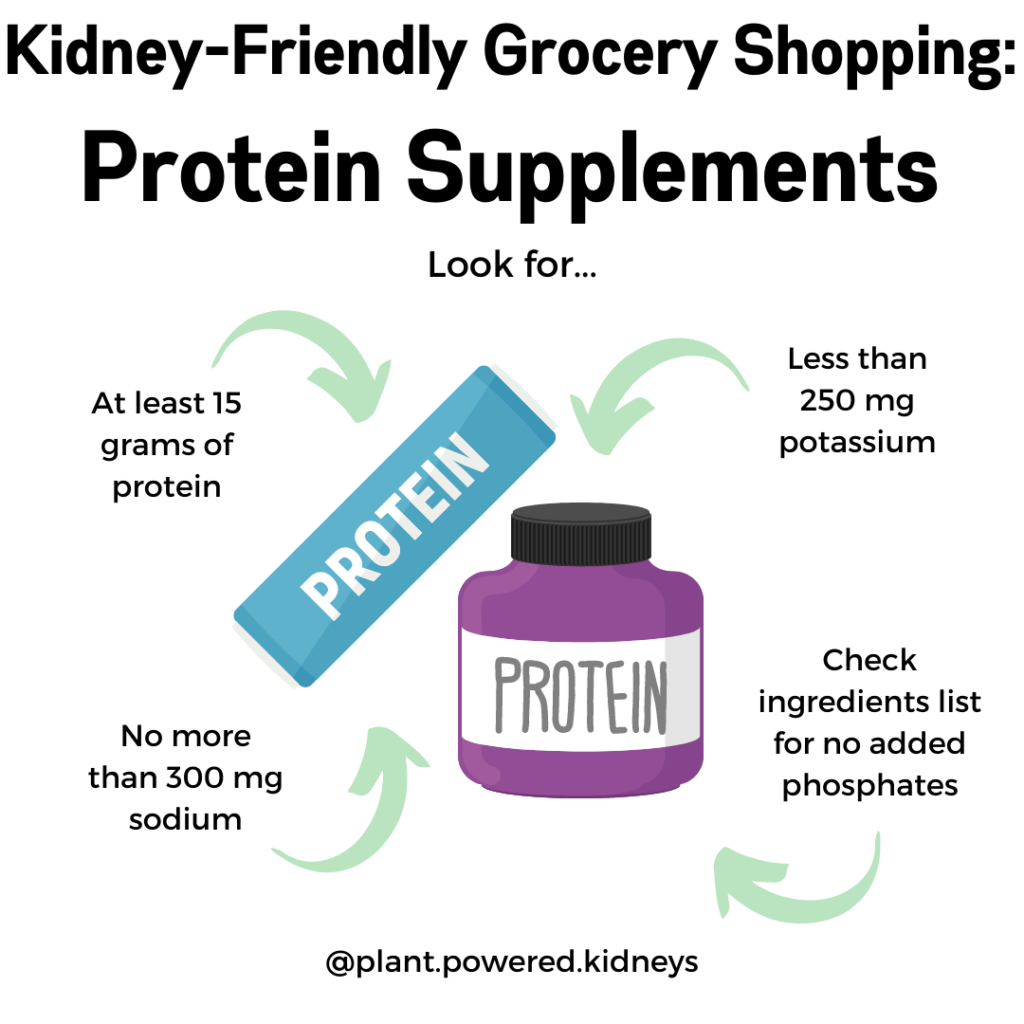
Protein Supplement Options
There are several different types of protein available for protein supplements. Here are some of the most common types.
Whey Protein
Whey is one of most common types of protein. It comes from milk.
Whey protein is obtained from the liquid part of milk when cheese is made. It contains branched-chain amino acids (BCAAs), which have been shown to help with protein loss in dialysis.
A study in 2018 found that whey protein supplements for dialysis patients provided improvements in weight management, nPCR, and dialysis adequacy.
It’s important to know that whey protein includes lactose, which may not be suitable for those with lactose intolerance.
Whey Protein Powder Supplements
Some whey protein powder supplements for dialysis patients are:
- Optimum Nutrition Gold Standard 100% Whey Protein Powder (vanilla)*: This protein powder includes 24 grams of protein per scoop, with only 150 milligrams of potassium and no added phosphates.
- Body Fortress Whey Protein (strawberry)*: This supplement provides 30 grams of protein per scoop. The potassium amount is 180 milligrams and sodium of 160 milligrams per scoop. However, be careful with the chocolate flavor. It is high in potassium at 320 milligrams per scoop.
- Pure Protein Whey Protein Powder (vanilla)*: This protein powder provides 25 grams of protein per scoop. It also keeps to 95 milligrams sodium and 170 milligrams potassium. They also list phosphorus (an uncommon feature) at 114 milligrams per serving, making this one a great protein supplement for dialysis patients.
Whey Protein Bar Supplements
When fluids are an issue, a protein bar can be a great alternative. Here are some examples of whey protein bars.
- Quest Nutrition Protein Bar (double chocolate chunk)*: This is a heavy-duty protein bar. It provides 20 grams of protein with only 180 milligrams of potassium. It is high in fiber, with 14 grams, making this a very filling bar. (Don’t be surprised if you can’t finish it in one sitting).
- BSN Protein Bars (peanut butter crunch)*: Another meal-sized protein bar, BSN bars will give you 20 grams of protein per bar. Potassium is only at 160 milligrams and sodium is comparable at 210 milligrams per bar.
- Authentic Bar (birthday cake)*: This whey protein bar provides 16 grams of protein with just 130 milligrams of each potassium and sodium. The amount of sugar is higher in this bar (15 grams added), but the calories (270) justify it as more satisfying.
- ONE Protein Bars (maple glazed doughnut)*: This line of whey protein bars provide 20 grams of protein per bar with minimal potassium (80 milligrams). Phosphorus is listed at 129 milligrams with no added phosphates! Fiber is more manageable at 7 grams with only one gram of sugar. Other delicious flavors include butter pecan and cinnamon roll.
Collagen Protein
Another type of protein is collagen. This is another type of protein found in the body. Collagen helps with our hair, skin, nails, and bones.
One study found that hemodialysis patients that were given a liquid collagen protein supplement at each dialysis treatment had improvements in their nPCR and albumin levels while on the supplement.
They mentioned that the results seemed temporary. Lab numbers declined when the supplement was discontinued.
Collagen Supplement Options
- Vital Proteins Collagen Peptides (unflavored)*: Two scoops of this collagen powder provide 18 grams of protein along with 90 milligrams of vitamin C. Can be stirred into hot or cold beverages. No potassium or phosphorus content is listed.
- Garden of Life Grass-Fed Collagen Peptides Powder (unflavored)*: Just one scoop of this collagen supplement will give you 18 grams of protein along with the probiotic lactobacillus plantarum and just 100 milligrams of sodium. No potassium or phosphorus content is listed.
- Vital Proteins Collagen Coffee Creamer (vanilla)*: If you’re a coffee drinker, you may or may not realize that some coffee creamers can be bad for dialysis. They often come with added phosphates – a definite no-no for CKD. This coffee creamer has no added phosphates, only 55 milligrams of sodium in 10 grams of protein per scoop. No potassium or phosphorus content is listed.
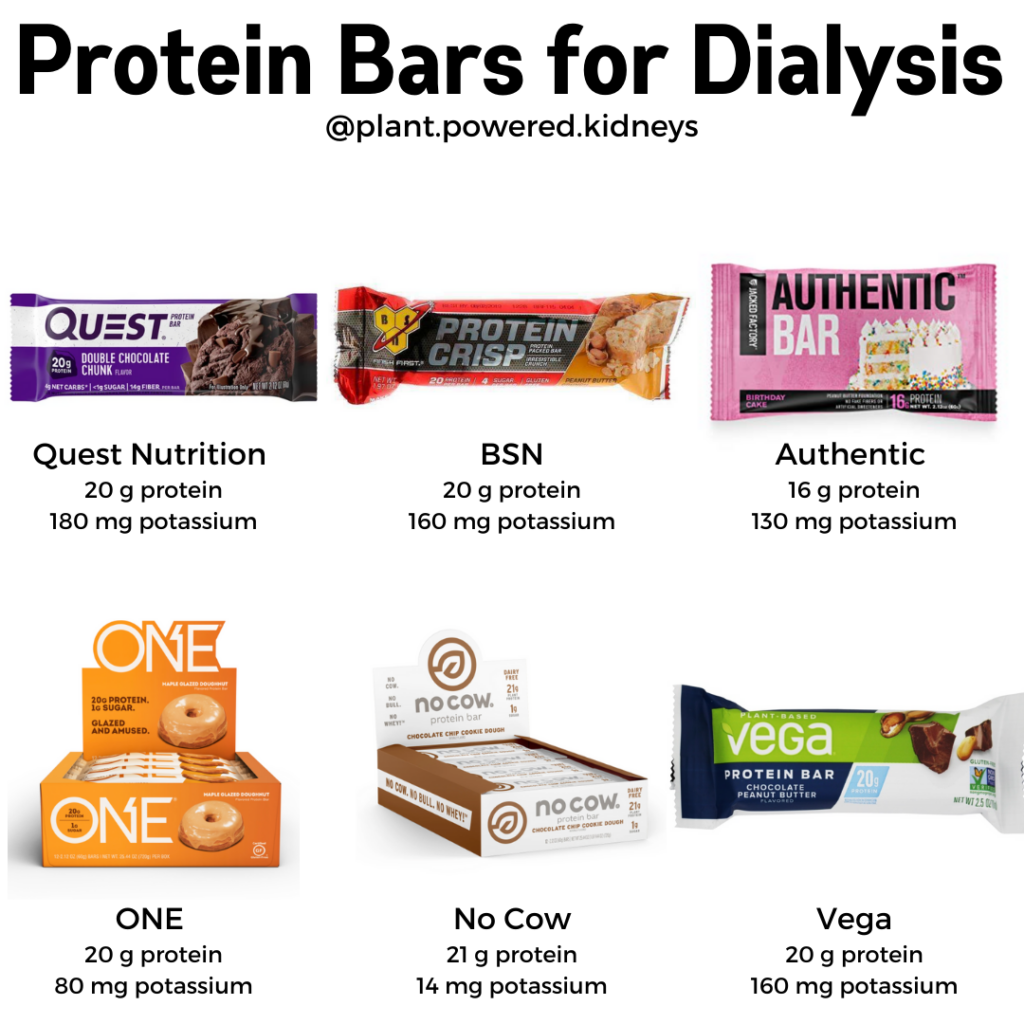
Pea, Hemp, and Brown Rice Protein
There are a variety of plant-based protein supplements available as popularity for a plant-based diet grows.
Some of the most common types of vegan or plant-based protein supplements include;
- Pea protein
- Hemp protein
- Brown rice protein
- Soy protein
These proteins can be beneficial, even in a dialysis diet. Plant-based proteins can provide other nutrients such as fiber and phytonutrients (good-for-you compounds).
Also, soy protein can be a great source of high biological value protein for those on dialysis.
A meta-analysis of protein supplements for people on dialysis showed that there was not enough evidence to show increases in potassium nor phosphorus. This is great for dialysis patients!
Within the meta-analysis, they looked at studies using both whey and soy protein sources.
Vegan/Plant-Based Protein Powder Supplements
Here are some recommendations for plant-based protein powder supplements for dialysis patients.
- Orgain Organic Plant-Based Protein Powder (vanilla)*: This vegan protein powder will give you 21 grams of protein in 2 scoops, along with just 80 milligrams of potassium. Sodium is on the higher end at 270 milligrams per serving, but with a bonus of 6.4 mg of iron, it’s still a great option!
- Vega Sport Premium Protein Powder (peanut butter)*: With natural flavors and even probiotics, this protein powder provides 30 grams of protein per scoop. Potassium is moderate at 250 milligrams per serving. Sodium amount is also manageable at 270 milligrams. You’ll get 5.5 milligrams of iron per serving as well.
- Garden of Life Raw Organic Plant-Based Protein Powder (vanilla chai)*: This protein powder touts extra benefits with probiotics and enzymes for better digestibility. With each scoop, you’ll get 22 grams of protein with only 47 milligrams of potassium and 180 milligrams of sodium.
Vegan/Plant-Based Protein Bar Supplements
- No Cow Protein Bar (chocolate chip cookie dough)*: The protein in this bar comes from a blend of brown rice and pea protein, with a total of 21 grams of protein per bar. Sodium is manageable at 220 milligrams per bar and only 14 milligrams of potassium. This is another high-fiber bar (16 grams!) that may be difficult to eat in one sitting.
- Vega Protein Bar (chocolate peanut butter)*: Another pea- and brown rice protein bar, this one will give you 20 grams of protein in one bar. After reaching out directly to the company, I learned that this bar has 160 milligrams of potassium and 125 milligrams of phosphorus.
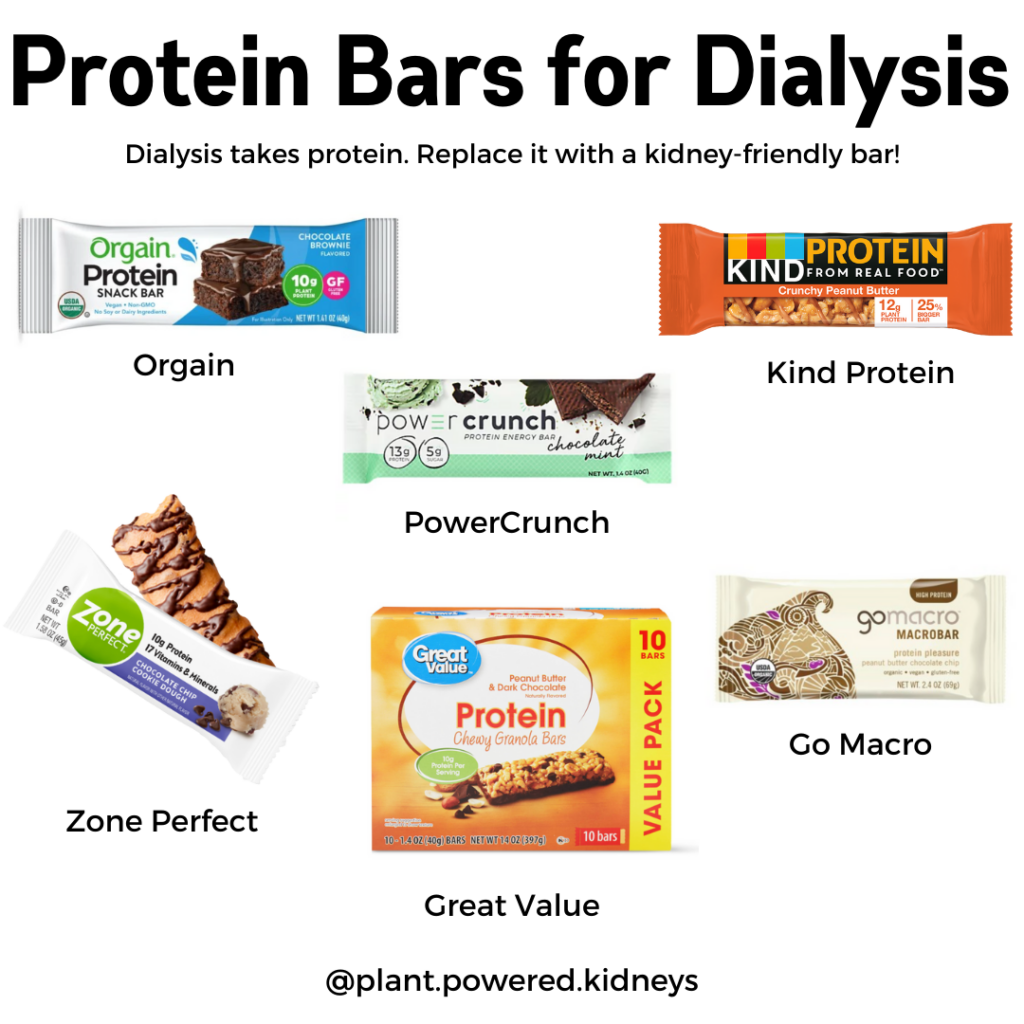
Table of Protein Supplements for Dialysis Patients
Here is a table of the different protein supplements reviewed in this article. Note that these are not the only supplements available. These have been reviewed by a renal dietitian as an option for those on dialysis.
Protein Powder Supplement Comparison Table
| Protein Powder | Serving Size | Protein (g) | Potassium (mg) | Sodium (mg) | Phosphorus (mg) |
|---|---|---|---|---|---|
| Optimum Nutrition 100% Whey Protein Powder (vanilla) | 1 scoop | 24 | 150 | 105 | n/a |
| Body Fortress Whey Protein Powder (strawberry) | 1 scoop | 30 | 180 | 160 | n/a |
| Pure Protein Whey Protein Powder (vanilla) | 1 scoop | 25 | 170 | 95 | 114 |
| Orgain Organic Plant-Based Protein Powder (vanilla) | 2 scoops | 21 | 80 | 270 | n/a |
| Vega Sport Premium Protein Powder (peanut butter) | 1 scoop | 30 | 250 | 270 | n/a |
| Garden of Life Raw Organic Plant-Based Protein Powder (vanilla chai) | 1 scoop | 22 | 47 | 180 | n/a |
| Vital Proteins Collagen Peptides (unflavored) | 2 scoops | 18 | n/a | 110 | n/a |
| Garden of Life Grass-Fed Collagen Peptides Powder (unflavored) | 1 scoop | 18 | n/a | 100 | n/a |
| Vital Proteins Collagen Coffee Creamer (vanilla) | 1 scoop | 10 | n/a | 55 | n/a |
Protein Bar Supplement Comparison Table
| Protein Bar | Serving Size | Protein (g) | Potassium (mg) | Sodium (mg) | Phosphorus (mg) |
|---|---|---|---|---|---|
| Quest Nutrition Protein Bar (double chocolate chunk) | 1 bar | 20 | 180 | 170 | 100 |
| BSN Protein Bar (peanut butter crunch) | 1 bar | 20 | 160 | 210 | n/a |
| Authentic Bar (birthday cake) | 1 bar | 16 | 130 | 130 | n/a |
| ONE Protein Bar (maple glazed doughnut) | 1 bar | 20 | 80 | 150 | 129 |
| No Cow Protein Bar (chocolate chip cookie dough) | 1 bar | 21 | 28 | 220 | n/a |
| Vega Protein Bar (chocolate peanut butter) | 1 bar | 20 | 160 | 290 | 125 |
A couple of notes about the information in the tables:
Information was obtained from the websites of the companies listed. Product information may change at any time. It’s important to read the labels for any changes.
All products were reviewed for no added phosphates. If a number is listed above, it is because it was listed on the nutrition facts. Otherwise, companies are not currently required to add phosphorus content to their nutrition label.
Again, companies may change their products at any time and without warning. Read the labels to look for no added phosphates. You can read more about phosphorus additives here.

Ready-to-Drink Protein Shakes
Another factor that makes protein supplements so appealing to dialysis patients is that they can be a great grab-and-go option.
However, many ready-to-drink protein shakes come loaded with phosphorus and potassium additives.
For example, Premier Protein and Pure Protein both have ready-to-drink protein shakes that are not kidney-friendly. This is because they both have phosphorus and potassium added to them.
Even Orgain’s plant-based protein shake has added trisodium phosphate.
Just because a shake is plant-based or organic does not mean it will be additive-free.
Nepro
Nepro is one of the most common ready-to-drink protein supplements for dialysis patients.
It is designed specifically for dialysis patients, being low in both potassium and phosphorus while also high in protein. It comes in vanilla, mixed berry, and butter pecan.
Nepro is also formulated to be safe for those with diabetes on dialysis. It has no added phosphates but does have potassium additives. The amount of potassium per 8-ounce carton is 225 milligrams.
While Nepro is intended for people on dialysis, a prescription is not required to purchase. You can find Nepro on Amazon* or even Walmart or other pharmacies.
It is very important to know that this drink is not advised if you have kidney disease and are not on dialysis.
Novasource Renal
Novasource Renal is another protein supplement specifically designed for people on dialysis. It comes in three flavors: vanilla, strawberry, and cafe mocha.
While it has no phosphate additives, it does have potassium additives. The total potassium amount per 8-ounce carton is 225 milligrams.
Similar to Nepro, Novasource can be purchased without a prescription. You can find it on Amazon* as well as Walmart and other pharmacies.
It is very important to know that this drink is not advised if you have kidney disease and are not on dialysis.
Oral Nutrition Supplement Program
Many dialysis clinics provide an Oral Nutrition Supplement Program.
This is a program where a person with a low albumin (usually at or below 3.5 mg/dL) qualifies for a protein supplement to be provided during dialysis treatment.
This is generally an optional program in which the patient can choose whether or not to receive a protein supplement free of cost.
To see if your dialysis center offers this service, speak with your dialysis nephrologist or dietitian.
Tips for Adding Protein Supplements to Your Routine
When adding protein supplements to your dialysis diet, it is important to find ways to make it not only a habit but something that fits into your lifestyle.
Here are some tips for how to add a protein supplement to your routine.
Start with Dialysis Days
Protein supplements are most often recommended for dialysis patients that aren’t getting enough protein. Because of this, it may be easiest to start by adding a protein supplement to your dialysis days.
Depending on your lab results, your dietitian may recommend you take more protein or stick with your current plan.
Eat Before Dialysis
Your dialysis clinic may have a certain policy about eating during treatment and for good reason. Some side effects of eating while on treatment can include nausea, vomiting, and fast drops in blood pressure (which can then lead to fainting).
The challenge is that dialysis takes a long time – potentially over 4 hours. Therefore, a person on dialysis can go a long time without eating.
Depending on how you feel before your dialysis treatment, it may be helpful to eat a protein bar beforehand. Your clinic may allow snacks in the waiting room. Just be sure to review your clinic’s rules or ask a staff member if it’s okay first.
Eat After Dialysis
If you don’t want to eat beforehand, maybe eating after will work better for you. This can be a great time to replenish your body of some of the protein lost during treatment.
The challenge that can arise here is that many people report feeling fatigued with little to no appetite after dialysis. By waiting until after dialysis, you may risk not eating enough.
If this is the case, but before dialysis won’t work, try breaking up a protein bar into small bites to slowly snack on. Or a protein shake mixed with water may be easier (just be careful with your fluid intake).
Use as a Bedtime Snack
Because protein bars can be filling and are generally sweet, they may make for a great evening snack.
Try adding in a protein bar the night before dialysis (or nightly if recommended by your dietitian).
Ask Your Dialysis Dietitian
In the United States, dialysis clinics are required to have a dietitian on staff to provide nutrition guidance and recommendations to dialysis patients. This includes protein supplement recommendations.
Speak with your dietitian about your protein needs and if or when you should have a protein supplement.
Don’t Forget Your Binder
As mentioned, protein supplements may have phosphorus. If you are taking a phosphorus binder to control your phosphorus levels, don’t forget to take your binder as prescribed.
Protein supplements may increase your phosphorus levels, which is why it’s important to discuss them with your nephrologist or dietitian first.
Summary
Protein supplements are very common for dialysis patients, given the need for more protein. With time constraints, as well as occasional low appetite, protein powders or bars can come in handy to provide an extra boost of protein.
The important factor in choosing the right protein supplement for your own needs is to work with your dialysis team. Speak with your dietitian to see if a protein supplement is a good addition to your dialysis diet.
Monitor your renal labs every month with your team to see if it is helping you. Check-in with yourself to see if you feel better with the extra protein.

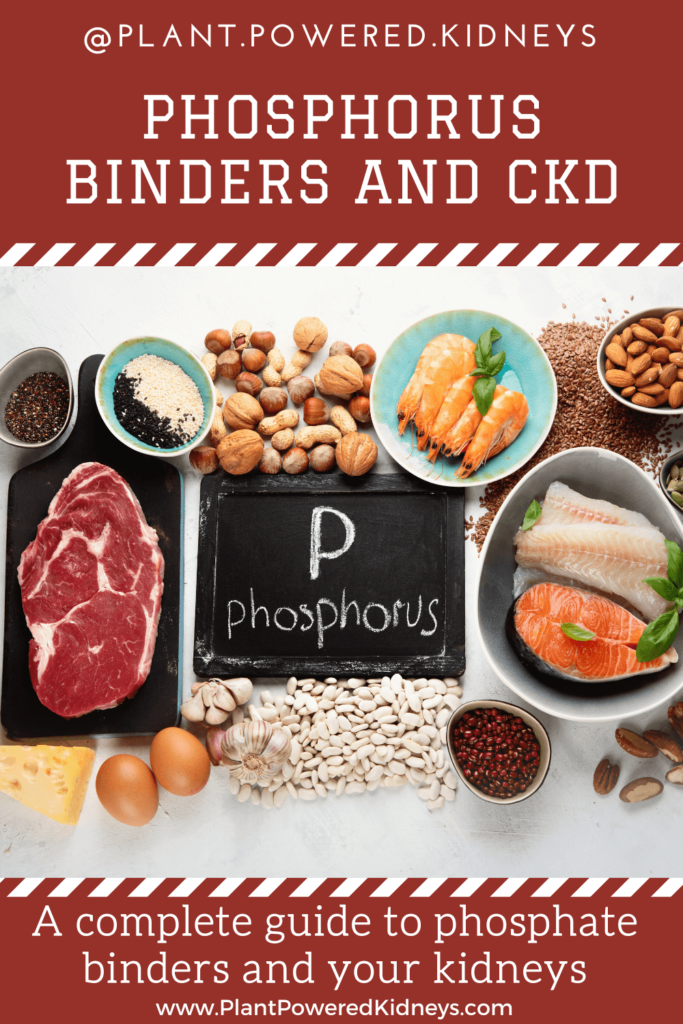

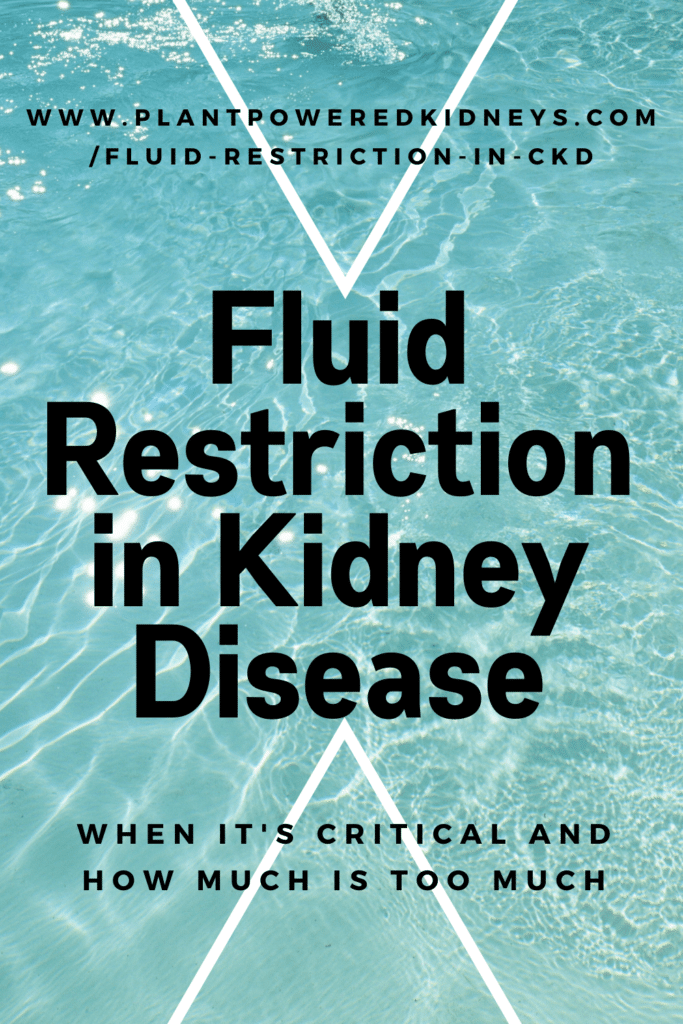
![17+ Gift Ideas for Dialysis Patients [Dietitian-Recommended]](https://www.plantpoweredkidneys.com/wp-content/uploads/2020/11/17-Dietitian-Recommended-Gift-Ideas-for-Dialysis-Patients-Blog-Title.png)

As a dialysis patient this article has been incredibly important to me. Thank you so much for explaining everything so well and showing pictures of actual products. Thank you once again Jen. 🤓
So happy to hear that! I used to have these kinds of chats with my dialysis patients all the time. I’m glad that I can still be a resource to dialysis patients from PPK. 🙂
Thank you Jen for this informative article.
So happy to help, Jack!
This resource has helped me so much. I am fairly new to diaylsis (7mo ) and I’m trying to figure it all out. My kidneys went into sudden failer and I was almost dead. In a comma, then rehab ECT. I don’t have heart problems , am not diabetic . I’m 74 and scared I will do something wrong.
Thank you for your help.
That makes me so happy, Cynthia! We really try to get you great resources here on the blog. Thanks so much for your kind words. I hope your health stays well into the new year. 🙂
Thank you very much. This is very helpful to me who is a vegetarian and just started dialysis.
Happy to hear that, Narasimha! A vegetarian diet on dialysis is definitely doable. 🙂
This was so helpful! So informative, thank you! I’ve been looking for some valid information for four years about which products are available and recommended specifically for dialysis patients. Being a peritoneal dialysis patient, it was nice to see you differentiate between that and hemo in your article. Saving this for future reference and appreciate you so much for this.
Hi Cindy,
Our Mission here at PPK is To simplify the nutritional understanding for individuals with kidney disease, and to decrease the prevalence of kidney disease by providing nutrition education including realistic and wholesome lifestyle changes. I’m glad we can help.
From another new Renal RD, why do you recommend Vital Proteins Collagen Peptides when it is not a complete protein? It lacks Tryptophan so would need to be consumed with another complementary protein source to provide the tryptophan AA to stimulate muscle protein synthesis. Any insight would be helpful. Thank you
It’s not necessarily something to replace any protein, but if it’s enjoyed and well tolerated by a patient (and their labs are improving), I wouldn’t be concerned about them including it. I would still encourage a variety of other proteins to be included in the diet.
I really appreciate all this information! My husband started dialysis this past December and we are now doing home hemodialysis. I found a protein powder called “Truvani Certified Organic Plant Based” vanilla flavored, made with only 5 ingredients. Sodium is 220mg, protein is 20g, potassium is 0g, and there is no phosphate in the ingredients. How can I determine its PERS rating?
I’m not sure what you mean by PERS rating – can you elaborate? The dietitian in your husband’s dialysis unit can also give you approval (or alternative) for protein supplements specifically around what your husband needs in a supplement.
Please advice suitable protein as am having protein loss and muscle wastage. My creatinine levels are 1.1.
Hi Ben! We cannot provide individual recommendations in this setting. Many find that a low-protein diet or a low-protein diet with ketoanalogues can be helpful, but it’s important to discuss these techniques with your healthcare team before starting them. **Changing your diet, especially to a low-nutrient diet, without professional guidance may cause more harm than good.**
Hi Jen
How is plant based protein with peanut butter ok for dialysis patients when is all made of peas, and mostly and nuts. And they claim it doesn’t have phosphorus. Peanuts and all nuts for that matter contains have phosphorus is why the dietician asked to limit its intake.
The ingredients list just seems too much for the system that’s already trying to get rid of toxins.
So I am sort of concerned with that piece of info otherwise thank you for the article and helping kidney pts.
Hi Pat, thanks for reaching out. It’s important to discuss personal recommendations with your dialysis dietitian. In my experience, many dialysis patients can enjoy peanut butter in their diet. Looking for peanut butter that is made *just* from peanuts is helpful. If you’re concerned about your phosphorus, this article may help you.
Thank you for this great article. I work at a dialysis clinic and my patients often ask me, “is XYZ okay?” It’s unfortunate that really the only options for ‘ready-to-go’ drinks are Novosource or Nepro. I wish there were more options out there.
Those are the ones that are marketed primarily for dialysis patients. However, other brands can be appropriate based on individual needs and preferences (not to mention affordability and accessibility). I’ve recommended Glucerna and Ensure in the past, and those have worked for some. 🙂